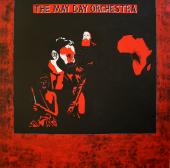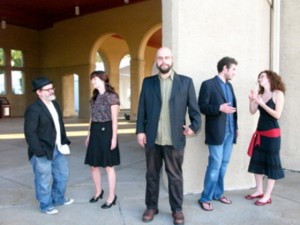Dreamed Another Circus: A May Day Orchestra Show Preview and Giveaway
November 9, 2010
The following show preview will be presented in three acts…
Act I: An Invitation
This Wednesday, May Day Orchestra will perform its new album, Ota Benga, in its entirety (with a 13-piece band) at Sheldon Concert Hall as part of MDO’s release show, which will also feature performances by Theodore and Rats + People Motion Picture Orchestra. Recently, the band launched a successful Kickstarter campaign to fund the production and release of Ota Benga on double vinyl.
Theodore will bring the driving live set we’ve grown to know and love in the city, and the ever-inventive R + P will play an excerpt from their score for the Swedish film, Haxan. Rats + People’s entire score will debut on November 19th at the International Film Festival.
The concert begins at 8pm, with doors at 7. Cover is $12.
Act II: An Explanation
Spearheaded by Tim Rakel, The May Day Orchestra is collective of musicians from various local bands, including the Union Electric, Tenement Ruth, Grace Basement, and Wednesday’s openers. MDO’s sound belongs to that of “folk opera,” which is a recent attempt to classify an emerging sound that blends history and folklore with intricate musical compositions.
The Ota Benga album artistically retells the true, wrenching story of a Congolese pygmy man in the early 1900s. Taken out of the Congo in the midst of massacres at the hands of Europeans colonizers, Ota Benga journeys first to the 1904 World’s Fair in St. Louis as a anthropological “exhibit,” and is later transferred to the Bronx Zoo. By 1906, in a startling display of inhumanity even by the day’s standards, Benga is being displayed among primates in the Monkey House at the Zoo.
Public dissent eventually causes Benga’s movement to Howard Colored Orphan Asylum. Continued dissent requires an additional, final move to Lynchburg, Virginia, where attempts are made to Americanize (that’s not the word) him. A poet and a Baptist elementary school are involved.
In 1916, unable to acclimate himself to a land where he has never felt at home, Ota Benga takes a pistol, turns it on his own heart, and fires.
Act III: A Reflection
Well, holy shit. That’s heavy for a Wednesday night show at the Sheldon, eh? Aside from the World’s Fair aspect of the Ota Benga history, you might wonder how May Day’s work is relevant to us now…
I offer you this: Most readers of the blog and most who might be in attendance on Wednesday are St. Louisans, by choice or by necessity. And we’ve found ourselves here by way of love or hate, opportunity or escape. And we pick on our city’s weaknesses and the people in it like a 5th grade bully, like our older brothers kicked us under the table during dinner as kids. But if we sit very still and very quietly, we realize that we feel that way because we’re in a city still attempting to find out where it fits in a larger context. St. Louis is as beautiful as it is broken, and because of cultural and socioeconomic striations, it’s possible to feel moved from one world to the next simply by traveling 20 miles east to west, or north to south as the case may be.
May Day’s Ota Benga story explains that the pygmy initially left the Congo somewhat willingly for the United States because his family has been massacred, and he thought himself to be dead, thus believing he was leaving one realm to enter the next. In America, Benga experiences the harsh by-products of fear, racism, and the like. It’s over a hundred years later, and as St. Louisans (and as humans) we’re still fighting ignorance and misunderstanding. We’re still figuring out where we fit.
Ota Benga was a man caged. Tim Rakel and May Day Orchestra, with their Ota Benga, try to set him free.



Comments (5)
This sounds totally cool. I cannot win, but I support the writing of comments 100%.
I have had the pleasure of listening to the CD, and it is an awesome accomplishment. Hearing it live will be a treat for sure.
Pingback: Tweets that mention I Went To A Show » Blog Archive » Dreamed Another Circus: A May Day Orchestra Show Preview and Giveaway -- Topsy.com
Awesome stuff…sounds like this will be a kick ass show.
I listened to the vinyl today. This write up really conveys what the album is about nicely. Thanks for the great words!